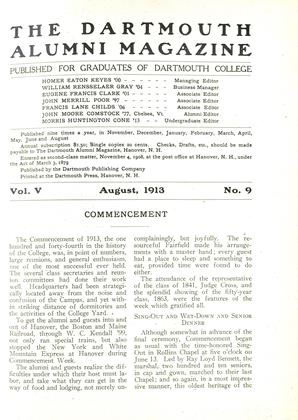A special committee of the trustees of the College has, during the past year, given much consideration to the question of medical education at Dartmouth, with the result that the board finally voted to discontinue the last two years of medical work. The following communication, which was sent to the alumni of the school states briefly the reasons for the action taken:
To the Alumni of the Dartmouth Medal School.—
The Trustees of Dartmouth College, after most careful consideration, have come to feel that it is wise, temporarily at least, for the institution to discontinue granting the degree of Doctor of Medicine. In order to make clear the reasons for such action, this communication is sent to the alumni of the Medical School."
The problem of preparing young men for the profession of medicine has, in recent years, become one of the most difficult of those that confront the educator. The discovery of the scientific basis for all infectious processes, and the now rapidly growing knowledge of physiological. chemistry, have, of necessity, greatly lengthened the period required for gaining an education in medicine. More important still, they have completely changed the methods of instruction ; for, whereas formerly a room where lectures could be given was virtually a sufficient plant, there is now the demand for great laboratories expensively manned and elaborately equipped. The increase-in the application of advanced scientific methods in the medical curriculum has, further, involved the necessity for better elementary preparation in science and in scientific habits of thought; in other words, for raising the standards of admission to the medical school. This has been accomplished by making from one to four years of college work the essential preliminary to medical training.
But this has not been all. In addition to the demand for more thorough scientific training, there has been a steadily growing consciousness of the fact that the public health is too important an asset to be entrusted to any but those completely equipped: in short, that, unlike the representative of any other profession or occupation, the medical man must leave the school a finished product, not only in scientific theory, but also in the highest practical application of that theory. By virtue of. this unique situation, the hospital as well as the laboratory must become, an integral part of medical school equipment, if the school would meet what appears to be the demand of the time.
Dartmouth College has been a leader in accepting the call for improved preparation, a longer course, and the providing and equipping of laboratories for medical training. It has found more difficult the supplying of full clinical facilities in the hospital. Situated as Dartmouth is, far from centers of population, a large out-patient department is clearly impossible; children's diseases, contagious cases, and important examples under general medicine cannot be secured in numbers sufficient for extensive study. The tendency of surgical cases toward the hospital makes that type of clinic amply large; the size of the medical clinic is limited by a geographical location which takes the matter out of the control of the Hitchcock Hospital or the Dartmouth Medical School.
Qutside influences must also be taken into account in any present consideration of medical education at Dartmouth. Such influences are exerted chiefly by state boards of medical registration, and by the educational council of the American Medical Association. The latter organization, in its investigation and rating of the medical schools of the country, has always commended the Dartmouth Medical School for its academic ideals and its readiness to advance its standards; yet it has insisted that the clinical facilities of the School did not entitle it to first rank. Leaving aside the question of the justice or the injustice of this attitude, to be ranked in second or third class by such a body as the American Medical Association would seriously reduce the ability of the school to attract desirable students. Still more prejudicial would be the refusal of state boards of registration to accept Dartmouth medical graduates for examination. The danger of such refusal, based on the assumed lack of clinical facilities, has of late been imminent.
It is in view of these considerations that the Trustees have decided upon the action announced in this statement The Medical School will continue as a department of Dartmouth College. It will, however, give only the first two years of medical work, which may be elected by undergraduates in the College. Courses will be so arranged that upon completion of them the student may, without loss of time, make transfer to the school of his choice, where he may find satisfactory clinical opportunities.
It is the sincere hope of the Trustees that the alumni of the Dartmouth Medical School will agree with them as to the wisdom of the action taken. Graduates of the School, will, as in the past, be cordially granted the use of the school laboratories, hospital facilities, and clinics, in the conduct of which their advice and cooperation is earnestly invited.
 View Full Issue
View Full Issue
More From This Issue
-
 Article
ArticleCOMMENCEMENT
August 1913 -
 Article
ArticleTHE STATE OF DARTMOUTH COLLEGE
August 1913 -
 Sports
SportsATHLETICS AT DARTMOUTH
August 1913 By Charles Ernest Bolser -
 Article
ArticleTHAYER SCHOOL OF CIVIL ENGINEERING
August 1913 By Robert Fletcher, Director -
 Class Notes
Class NotesCLASS OF 1878
August 1913 By William D. Parkinson,, WM. D. PARKINSON, -
 Class Notes
Class NotesCLASS OF 1908
August 1913 By Lawrence M. Symmes,, LAURENCE M. SYMMES,
Article
-
 Article
ArticleBoston Dinner
February 1939 -
 Article
ArticleTuck-Thayer Graduates
July 1948 -
 Article
ArticleMasthead
JANUARY 1973 -
 Article
ArticleLet the Good Times Roll: A Preview of Ivy League Football, 1973
October 1973 -
 Article
ArticleHarry Hillman
October 1945 By Don Burnham. -
 Article
ArticleDirty Pictures from the Prom.
DECEMBER 1969 By RUSSELL L. CAPLAN '72


